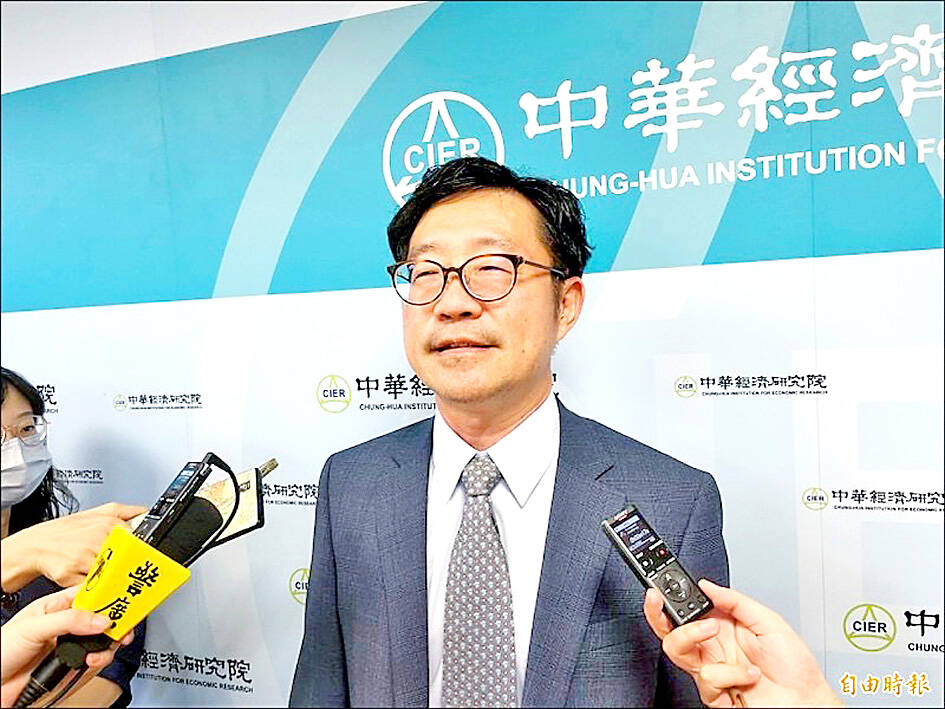The Chung-Hua Institution for Economic Research (CIER, 中華經濟研究院) yesterday raised its forecast for Taiwan’s GDP growth this year to 3.96 percent from 3.81 percent, as strong global demand for artificial intelligence (AI) bolsters exports and domestic demand receives support from improving private investment and a positive wealth effect.
“The development of artificial intelligence by major technology titans has positively impacted Taiwan’s economy as seen by robust business at local firms in its supply chain,” CIER president Lien Hsien-ming (連賢明) said.
Companies involved in making AI chips, servers and graphics processing units have posted growing revenues and profit margins, and offered guidance that the momentum would continue for the foreseeable future, CIER said.

Photo: Hsu Tzu-ling, Taipei Times
Exports are projected to expand 6.73 percent year-on-year this quarter, slowing from 8.05 percent in the preceding quarter due to a high comparison base, the Taipei-based institute said.
Imports are expected to rise 9.24 percent annually this quarter, as firms acquire capital equipment from abroad to upgrade technology processes and expand capacity, it said.
For the whole of this year, exports are likely to rebound 9.24 percent, reversing a 9.8 percent decline last year, CIER said, adding that it expects imports to emerge from a 17.86 percent contraction to log a 9.92 percent increase.
On the domestic front, private consumption is expected to gain 2.22 percent this quarter with national holidays and major retail sales seasons approaching, Lien said.
Many department stores are celebrating their anniversaries and the Singles’ Day shopping festival next month would lend further support to e-commerce revenues, the think tank said.
This quarter is also the high season for sales of hotel and restaurant coupons, as well as tour packages at home and overseas, in line with the annual travel fair next month, it said.
Overall, consumer spending might increase 2.67 percent this year on top of an 8.19 percent advance last year, it said.
The sturdy private consumption has to do with wealth inflation induced by the TAIEX, Lien said.
In addition, private investment is playing an important part in upholding domestic demand, with the key GDP component predicted to rise 2.89 percent this year, in stark contrast with an 8.24 percent retreat last year, CIER said.
Improved business orders have allowed local firms to grow more comfortable with capital expenditure, it said.
Consumer prices are expected to increase 2.17 percent this year, but fall below the central bank’s 2 percent target at 1.96 percent next year, the institute said.
Electricity rate hikes and bad weather have kept service charges and food costs elevated this year, Lien said.

Hon Hai Precision Industry Co (鴻海精密) yesterday said that its research institute has launched its first advanced artificial intelligence (AI) large language model (LLM) using traditional Chinese, with technology assistance from Nvidia Corp. Hon Hai, also known as Foxconn Technology Group (富士康科技集團), said the LLM, FoxBrain, is expected to improve its data analysis capabilities for smart manufacturing, and electric vehicle and smart city development. An LLM is a type of AI trained on vast amounts of text data and uses deep learning techniques, particularly neural networks, to process and generate language. They are essential for building and improving AI-powered servers. Nvidia provided assistance

GREAT SUCCESS: Republican Senator Todd Young expressed surprise at Trump’s comments and said he expects the administration to keep the program running US lawmakers who helped secure billions of dollars in subsidies for domestic semiconductor manufacturing rejected US President Donald Trump’s call to revoke the 2022 CHIPS and Science Act, signaling that any repeal effort in the US Congress would fall short. US Senate Minority Leader Chuck Schumer, who negotiated the law, on Wednesday said that Trump’s demand would fail, while a top Republican proponent, US Senator Todd Young, expressed surprise at the president’s comments and said he expects the administration to keep the program running. The CHIPS Act is “essential for America leading the world in tech, leading the world in AI [artificial

DOMESTIC SUPPLY: The probe comes as Donald Trump has called for the repeal of the US$52.7 billion CHIPS and Science Act, which the US Congress passed in 2022 The Office of the US Trade Representative is to hold a hearing tomorrow into older Chinese-made “legacy” semiconductors that could heap more US tariffs on chips from China that power everyday goods from cars to washing machines to telecoms equipment. The probe, which began during former US president Joe Biden’s tenure in December last year, aims to protect US and other semiconductor producers from China’s massive state-driven buildup of domestic chip supply. A 50 percent US tariff on Chinese semiconductors began on Jan. 1. Legacy chips use older manufacturing processes introduced more than a decade ago and are often far simpler than

Gasoline and diesel prices this week are to decrease NT$0.5 and NT$1 per liter respectively as international crude prices continued to fall last week, CPC Corp, Taiwan (CPC, 台灣中油) and Formosa Petrochemical Corp (台塑石化) said yesterday. Effective today, gasoline prices at CPC and Formosa stations are to decrease to NT$29.2, NT$30.7 and NT$32.7 per liter for 92, 95 and 98-octane unleaded gasoline respectively, while premium diesel is to cost NT$27.9 per liter at CPC stations and NT$27.7 at Formosa pumps, the companies said in separate statements. Global crude oil prices dropped last week after the eight OPEC+ members said they would